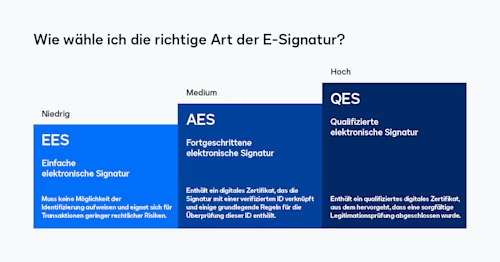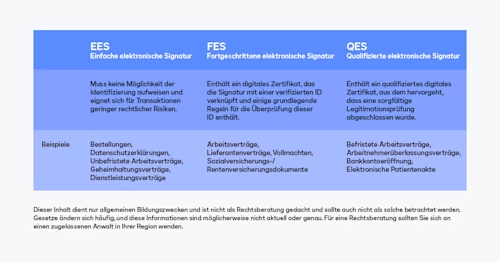
QES, FES oder EES?
Erfahren Sie jetzt, welche Dokumente welchen Signaturtyp voraussetzen – damit Sie stets auf der sicheren Seite sind.

Die Vorteile der elektronischen Signatur erleichtern bereits vielen Unternehmen den Arbeitsalltag. Die Möglichkeit rechtssicher, schnell und ressourcensparend Verträge zu unterzeichnen steigert die Produktivität in vielen Abteilung maßgeblich – während sie Zeitaufwand und Kosten senkt.
Durch die gesetzliche Grundlage, festgehalten in der eIDAS-Verordnung, besitzt die elektronische Signatur den gleichen Stellenwert wie eine Unterschrift per Hand. Ein entscheidender Vorteil bei internationalen Geschäftsbeziehungen und großen Vertragsmengen, die täglich bewältigt werden müssen.
Die elektronische Signatur per se ist somit rechtssicher, je nach Anwendungsfall wird jedoch ein unterschiedliches Sicherheitsniveau verlangt. Hier sind manche Unternehmen noch unsicher, welche Sicherheitsstufe für ihre Anforderungen die richtige ist. Erfahren Sie jetzt, welche Dokumente welchen Signaturtyp voraussetzen – damit Sie auf der sicheren Seite sind.

Hier geht es zu den 10 Fakten zur E-Signatur für den deutschen Mittelstand.
Die einfache elektronische Signatur
Jeden Tag besuchen wir Webseiten, bei denen wir unsere Erklärung für die Datenschutzbestimmungen abgeben. Wir schicken Bestellungen ab oder downloaden Apps – in all diesen Fällen kommt die einfache elektronische Signatur (EES) zum Tragen. Unterlagen, die keiner festen Form entsprechen müssen und ein geringes Haftungsrisiko aufweisen, können mit diesem Signaturtyp unterzeichnet werden. Durch die einfache elektronische Signatur wird der Unterzeichnungsprozess schnell und unkompliziert. Die Identifizierung erfolgt dann über die E-Mail-Adresse. Digitale Vereinbarungen begegnen uns täglich in einer Vielzahl
Sogenannte Clickwraps wie Standardbestimmungen
Interne Dokumente
Kostenvoranschläge und Auftragsbestätigungen
Erleben Sie selbst, wie einfach Lösungen auf den ersten Klick sein können – mit unserem Produkt Docusign Click.
Die fortgeschrittene Signatur
Wenn Dokumente eine größere Rechtssicherheit brauchen, ist die fortgeschrittene elektronische Signatur (kurz FES) das Mittel der Wahl. Die FES ist der rechtssichere Signaturtyp für Verträge ohne Formvorschrift. Der Abgleich von Sicherheitsschlüsseln ermöglicht die Nachvollziehbarkeit der Signatur, identifiziert den Unterzeichner und zeigt die Zeitpunkte der Signatur an. Dadurch wird sichergestellt, dass keine nachträglichen Änderungen am Dokument vorgenommen wurden.
Die Rechtskonformität der fortgeschrittenen elektronischen Signatur wird durch die eIDAS-Verordnung festgelegt und bildet somit eine EU-weit legitimierte Option zum elektronischen Unterzeichnen. Dadurch wird diese Form der Signatur auch von der EU unterstützt und rechtlich abgesichert. Für die voranschreitende Digitalisierung ist das eine große Erleichterung, da die meisten Vertragsformen mit der fortgeschrittenen elektronischen Signatur unterzeichnet werden können. Dazu gehören zum Beispiel:
Mietverträge
Arbeitsverträge
Lieferantenverträge
Wussten Sie, dass Ihre Kunden dank unserer SMS-Benachrichtigungen nun noch schneller Zugriff auf Verträge haben und diese sicher und einfach auf mobilen Endgeräten unterzeichnen?
Signieren Sie mit Docusign eSignature rechtskonform und ortsunabhängig Dokumente. Warum Docusign? Erfahren Sie hier mehr!
Die qualifizierte elektronische Signatur
Für ein besonders hohes Maß an Sicherheit bietet Ihnen die qualifizierte elektronische Signatur eine praktische und zeitsparende Möglichkeit für einen digitalen Workflow. Sie kommt dann zum Einsatz, wenn Dokumente die Schriftform verlangen. Neben der technischen Zuordnung zur Nachvollziehbarkeit des zu unterzeichnenden Dokuments muss sowohl eine persönliche oder digitale Identifizierung als auch eine Zwei-Faktoren-Authentifizierung stattfinden.
Arbeitnehmerüberlassungsvertrag
Verbraucherdarlehensvertrag
Regulierte Umgebungen (Finanzen, Pharmaindustrie, Arbeitsrecht)
Docusign Identify bietet Ihnen eine sichere und schnelle Lösung für die Identitätsüberprüfung in Ihrem Vertragsworkflow. So können Sie auch Kontoeröffnungen, Onboarding-Prozesse, Versicherungs- und Finanzierungsanträge nahtlos online durchführen. Für die digitale Identifizierung arbeitet Docusign mit Vertrauensdiensten und APIs zusammen und bietet dadurch individuelle Lösungen und Erweiterungen für Ihr Unternehmen an.
Der Technologieführer Voith steht für Innovation und Fortschritt – und das zeigt sich auch bei den digitalen Lösungen des Baden-Württembergischen Konzerns. Mit Docusign eSignature unterzeichnet Voith im Homeoffice nicht nur bequem und ressourcensparend Lieferanten- und Rahmenverträge, sondern auch Arbeitnehmerüberlassungen mit der qualifizierten elektronischen Signatur. Mehr über die Erfolgsgeschichte von Voith erfahren Sie hier.

Mit Docusign auf der sicheren Seite
Gehen Sie kein Risiko ein, wenn es um die Rechtssicherheit Ihrer elektronischen Signatur geht. Mit Docusign finden Sie für jeden Signaturtyp die passende Lösung, um Verträge schnell, einfach und rechtskonform zu unterzeichnen. Entdecken Sie hier die cloud-basierten Produkte von Docusign.
Ähnliche Beiträge
Docusign IAM ist die Vertragsplattform, die Ihr Unternehmen braucht



